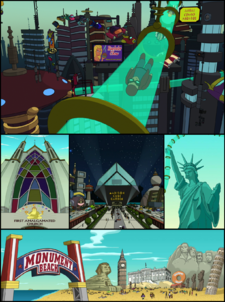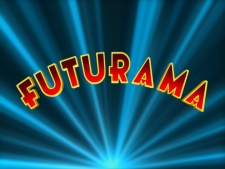Futurama
- For other uses, see Futurama (disambiguation).
| Futurama | |
|---|---|
| Genre | Comedy |
| Format | Animation |
| Created by | Matt Groening |
| Developed by | Matt Groening David X. Cohen |
| Country of origin | United States |
| Production | |
| Producer(s) | Matt Groening David X. Cohen Ken Keeler |
| Runtime | Episodes: Approximately 22 minutes Films: Approximately 88 minutes |
| Production company(s) | The Curiosity Company 30th Century Fox |
| Broadcast | |
| Channel | Fox (1999–2003) Comedy Central (2008–2013) |
Futurama is an animated television series created and developed by Matt Groening (creator of The Simpsons) with David X. Cohen (also a writer for The Simpsons). Set in New New York City in the 31st century, it was introduced on the Fox Broadcasting Company and received airplay between 28 March, 1999 and 10 August, 2003. It is currently in syndication on FX in the United States, on Teletoon in Canada, on Sky1 and Sky2 in the United Kingdom, and on Fox8 and Network Ten in Australia.
The series begins when Philip J. Fry, a New York City slacker and pizza delivery boy, is cryogenically frozen by accident on New Year's Eve, 1999 or New Years Day, 2000 (for the first few seconds). He is defrosted one thousand years later on New Years Eve, 2999 and finds himself in New New York City. Fry thinks he has a chance at a new life, only to find himself being permanently assigned a career as a delivery boy. Fry's attempts to escape from his now-mandatory job assignment end at Planet Express, a small intergalactic package delivery company run by his distantly descended nephew, where he is hired on as a delivery boy. The series covers the adventures of Fry and his colleagues as they travel around the universe making deliveries on behalf of Planet Express.
Setting

- Main article: Setting
The setting is first and foremost a backdrop for humor, and the show is not above committing continuity errors if they serve to further the gags. The capabilities of many things (and even characters) vary according to what is most appropriate for the situation at hand.
The visually retro-futuristic world of Futurama is not a utopia but neither is it a dystopia. Unlike past cartoons like The Jetsons, which showed an efficient, clean, happy future, Futurama portrays a less idealistic view, with humans still dealing with many of the same basic problems of the 20th century. The show's vision of the future is very similar to the present in many ways: the same political figures and celebrities that we know today survive as heads in jars (a method invented by Ron Popeil's head), television remains the primary means of entertainment, the Internet is still slow and filled with ads and pornography, problems such as global warming (although this was revealed to be canceled out by a nuclear winter), inflexible bureaucracy, and substance abuse are still pressing issues. This is possibly because Bender Bending Rodriguez went back in time and destroyed most of New New York.
Race issues in 3000 are now centered around relations among humans, aliens, and robots. A common clash between the former two is alien immigration plaguing Earth. Humans find it hard to treat aliens with respect because of their differences, as is seen with the Decapodians, who probably evolved from something resembling a lobster, and because of various invasions and obliterations of Earth in the past.
A specific issue on Earth is the large population of super-intelligent/super-incompetent robots (homeless robots and orphan children robots, like Tinny Tim); they are generally lazy, greedy and surly (with the exception of the sycophantic super-efficient Robot 1-X), and often unwilling to assist their human creators. Almost all robots are fueled by alcohol-based substances, leading to widespread enviromental pollution. Robots are treated as independent beings – indeed only twice in the series are robots referred to as property (in "The Route of All Evil", Cubert refers to Bender as "company property," and in "The 30% Iron Chef" the Professor shouts "That's my robot! I own him!"). In fact, over the years robots have devolped their own culture, with publications, music and religion.
Despite this, Futurama's world also showcases numerous technological advantages that have been developed by the year 3000. Wheels used in transportation have been made obsolete by hover technology, to the point that 31st century characters do not know what a wheel is. Among the robots, spaceships, and floating buildings, Professor Farnsworth introduced many memorable new inventions such as the Smell-O-Scope, the What-If Machine, and the Fing-Longer. Less inspiring 31st-century innovations include coin-operated suicide booths (said in the show to have been in business since 2008) Soylent Cola (the taste "varies from person to person"), and Slurm, the highly addictive green ooze secreted by a termite-esque Queen (revealed in "Fry and the Slurm Factory"). Slurm is advertised at every opportunity on Futurama, whether in conventional television adverts, or on giant blimps flying past in the background.
Large companies hold a massive amount of power in the year 3000, in particular Mom's Friendly Robot Company, which builds and controls almost every robot on earth. Advertising is everywhere, and people often buy products not knowing or caring what goes into them or who manufactures them – for example, the unrestrained human consumption of "Popplers" which turned out to be alien young.
Some of the show's humor comes from passing references to historical events of the past thousand years. For example, in the time that has passed, formerly endangered owls and marmosets have emerged as the primary urban pests, at the expense of rats and pigeons. Anchovies, poodles, cows, and pine trees have also been extinct for centuries. Los Angeles has become a wasteland, Fry mistaking it for New New York in the year 4000 after believing he had been cryogenically frozen for a further 1000 years. Atlanta, after being moved to sea, sinks due to overdevelopment and becomes a "lost city" (a parody of the story of Atlantis); its residents evolve (with the help of Coca-Cola's caffeine) into mermaids. In another episode, Pamela Anderson mentions that she won an Academy Award for Baywatch: The Movie, the first ever movie to be filmed entirely in slow-motion.
Narrative format
Futurama follows a typical animated sitcom series structure from episode to episode, meaning that a new viewer can watch any particular episode and know what is happening without prior knowledge of the episodes previous to it. There are, however, examples of story arcs throughout the series, in the form of character relationships like that of Fry and Leela and Kif and Amy, or continuity aspects involving the Nibblonian plan for Fry to be frozen, but principally, each episode resolves itself without directly influencing the episode after.
Appeal
The main audience of Futurama is comprised mostly of self-described "nerds". This is due in part to the fact that much of the humour on Futurama is derived from the fields of mathematics, physics, computer science, and a hefty dose of Star Trek: The Original Series and Twilight Zone references. In fact, several members of the crew have PhDs in these fields.
Additional information
Quotes
[The following is the transcript of an excerpt of an interview given by Matt Groening to television critic and writer Michael Idato.]
Michael Idato: With the return of Futurama, in a way, you're like the parent who had one child that was lorded, given everything in the world, an' the other child was actually taken away from you for several years tragically by family services. You now have that— [Matt Groening laughs.] You now have that child back an' that child has actually been given its chance to breathe an' live an' sow. How do you feel about that as a parent?
Matt Groening: Well... [Matt Groening laughs.] As a parent? Well... Well... Sophie's Choice. Is that what you're saying?
Michael Idato: It's like that.
Matt Groening: Well, uh... I... You know. I... I love Futurama because it is - it is - as you said - you know - the neglected, abused child who was taken away an' now we, we... [Matt Groening laughs.] We... We got 'er back. Her? I dunno. Futurama. I guess - you know - I've never thought of the sex of Futurama, but - yes - it must be a she.
[The following is an excerpt of an interview given by Matt Groening to Metro journalist Simon Gage.]
Simon Gage: You have these two hugely successful shows. Do you have an idea for a third show bubbling away in the back of your mind?
Matt Groening: I certainly have enough on my hands to do with these two. But the really great thing about having two TV shows going on at the same time is that I can go to one and say that I have to go and visit the other and then I can just go home and they don’t know. I do have lots of ideas and it’s really fun to create a new fictional world. Who knows, maybe one day I’ll get around to doing them. But on the other hand I could easily fill up my entire life just working on Futurama. I just have so much fun with it.
Appearances
The word "Futurama" is often used in title captions, as well as by sponsors, in recaps, and in titles. Mentions of Futurama in recaps are not listed, as they occur in all recaps.
See also
- Broadcast
- Dubbing
- In popular culture
- Loose ends
- Opening sequence
- Production
- Soundtrack
- Themes
- Timeline
External links
- The Futurama Point A Futurama hub dedicated to everything Futurama-related.
- Can't Get Enough Futurama A Futurama news page.
